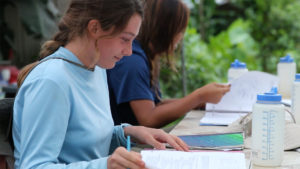By Brian Konik, Ph.D. and Kristen McFee, MA, LPCC
I am always inspired and impressed when I watch a student complete his or her legacy garden project: they are beaming with pride, smiling, wiping sweat off their soil-covered faces. And I know how many steps it took them to get here. Managing their schedule to find extra time with all of their other obligations. Days are full of academic work, therapy, yoga, groups, gardening, cooking, cleaning and yet they learn to develop a schedule and make time to create something special. The goal is to find inspiration and work hard to produce something that others who follow will benefit from. To give back to the land and the Ohana (family). I have seen beautifully constructed lava rock walls, medicinal herb gardens, and bamboo furniture pieces, all created by students. Such accomplishments would be great for any student but they are uniquely important for those who have struggled with a lifetime of frustration dealing with learning differences often coupled with executive functioning deficits.
Pacific Quest’s horticultural therapy focus provides a unique environment for students who struggle with a combination of cognitive and emotional/behavioral issues. Pacific Quest utilizes a strength-based, “multiple intelligence” approach to learning. This approach is rewarding for students who may not have achieved acknowledgement for their strengths and abilities in traditional settings. The garden setting especially promotes growth in students’ executive functioning skills like organization, planning, abstract reasoning, memory, and attention.
Gardening provides a soothing environment where the nervous system can become regulated, offering opportunities to “access” cognitive-behavioral interventions. By placing the student in the role of the project manager and creative problem solver in the garden, each is forced to simultaneously engage in visual-spatial organization skills and interpersonal communication. This combination of skills can be particularly challenging for students who struggle with executive functioning deficits.
Many students find that their executive functioning deficits not only impact academics, but just as importantly affect their social relationships. Effort is taken to encourage social relationships, learn and practice social pragmatics and for students to have an integral role in a supportive peer group. A series of therapeutic horticultural experiences are offered with the intention of accessing the biological processes of the garden in order to increase interaction with the non-linear aspect of nature, increasing mental flexibility.
Therapists help the family reach an understanding of how learning differences contribute to the the stress response of the student, help the family avoid negative attributions to the student, and create understanding and acceptance within the family system. The family works toward balancing emphasis on both struggles and strengths, as it can be easy to lose sight of the strengths in face of struggles.
It is a unique experience to be apart of how this integrative approach is helpful in understanding and treating those with learning differences and executive functioning deficits. It is rewarding to see students empowered through their success in the garden. I am grateful to be a part of the growth process of so many students who work hard to learn and grow every day, taking one more step to overcome their challenges.